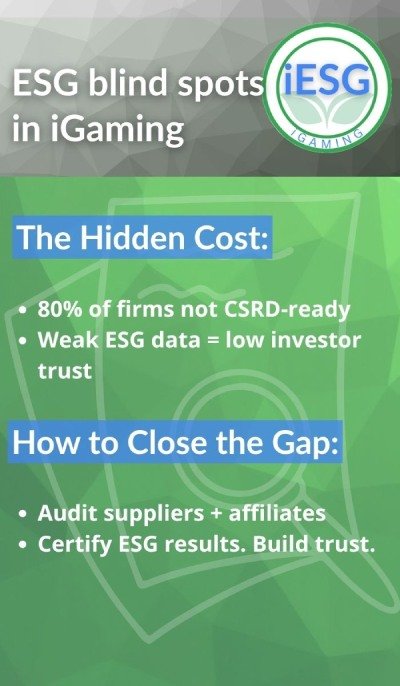Many of the major iGaming brands now talk about sustainability. Annual reports highlight inclusion, social impact, and responsibility. But behind the headlines, many operators still lose millions each year because of unaddressed weaknesses in their ESG strategies. These ESG blind spots in iGaming show up in inefficient processes, incomplete reporting, and decisions made without data.
Findings in BDO’s ESG Strategy for Gaming 2024¹ show a gap between reported progress and what investors trust. When sustainability numbers are unclear or unaudited, confidence slips. Valuations get questioned as soon as disclosures look thin.
With the European Commission’s new reporting rules approaching, transparency is no longer an option. It is the baseline for any operator that wants continued access to funding and partnerships.
Find out where most companies fall short on ESG and how they can close those ESG blind spots in iGaming … before regulation and market pressure catch up.
#1. ESG Blind Spots in iGaming: The Hidden Cost of Partial ESG Compliance
Many operators think they are on track because they publish sustainability pages or brief CSR statements. But partial compliance is costly. Without measurable data, those statements carry little weight. The Corporate Sustainability Reporting Directive (CSRD) requires companies to produce detailed, auditable ESG metrics by 2026². Yet studies show that roughly four out of five European gaming firms are still far from meeting that standard.
Weak ESG reporting carries a financial cost, not just a reputational one. Regulators, investors, and even business partners now read sustainability disclosures as signals of how well a company manages risk. Firms that cannot back up their claims with data are increasingly viewed as high risk.
Many institutions now invest only in businesses that can track and publish measurable data on energy use, waste management, and workforce diversity.
Kindred Group has strengthened its standing with investors by publishing clear, verifiable ESG data³. Its consistent reporting has lifted confidence and ratings alike. Smaller operators that still rely on old pledges or vague sustainability claims often end up in longer audits and tighter lending reviews. Getting capital takes more time and more proof when the data behind the promises is thin.
📊 Ready to find your own ESG blind spots in iGaming? Our iESG Assessment helps operators benchmark their environmental, social, and governance performance with measurable data. It highlights compliance gaps, strengths, and improvement areas, giving you a clear ESG score and roadmap before investors or regulators demand it.
#2. ESG Blind Spots in iGaming: Supply Chain and Affiliate Exposure
A surprising share of a gaming company’s footprint sits outside its own offices. Software services, hosting firms, and affiliates all add to the impact. The thing that can get problematic is that if those partners aren’t monitored, small gaps can quickly grow into larger risks.
Back in 2023, the UK Gambling Commission fined several operators after affiliate ads clearly misled players⁴ (guaranteed wins, unclear T&Cs etc.). That case not only serves as a warning but showcases how fast reputational damage can spread when oversight falls short. On the tech side, heavy data-center usage brings another layer of exposure. Power-hungry data centers running on fossil grids can represent more than half of a gaming company’s emissions⁵.
Betsson Group moved workloads to renewable-powered servers and set sustainability rules for its affiliate network⁶. Flutter Entertainment has built supplier audits into its ESG process, checking vendors for energy efficiency and data privacy compliance. These moves prove that tracking your supply chain protects both reputation and margin.
Examining such weak links or ESG blind spots in iGaming and dealing with them goes hand in hand with business advantages: it saves money, reduces emissions, and builds trust with investors and regulators.

🎓 Collaboration is the strongest form of accountability. The iESG Membership connects operators, suppliers, and affiliates who commit to measurable sustainability and governance standards. Members gain access to shared frameworks, partner audits, and visibility among ESG-aligned businesses.
#3. ESG Blind Spots in iGaming: The Governance Gap
In plenty of companies, ESG is becoming more and more of a topic. However, many of these ESG responsibles sit a few levels below where they should. ESG and sustainability are not just in the compliance lane … it’s a boardroom subject, and if not handled properly goals lose focus and progress stalls.
According to McKinsey’s ESG Premium Report 2024⁷, firms that tie ESG results to executive targets tend to perform better over time. When leaders treat ESG as a management tool rather than paperwork, it starts driving real business value.
At Flutter Entertainment, a portion of executive pay depends on hitting carbon reduction and safer gambling targets⁸. That structure forces ESG results into core performance metrics. Companies that keep sustainability outside the boardroom tend to react to regulation instead of shaping it. In an industry built on speed, that lag is expensive.
Put simply, governance turns ESG blind spots in iGaming from spin into strategy. It becomes part of how the business grows, not just how it talks.
#4 . ESG Blind Spots in iGaming: Greenwashing and Reputation Risk
Some brands still treat sustainability as a slogan. Claims about being “carbon neutral” or “green” need evidence. Under the EU Green Claims Directive, unverified statements will bring penalties from 2026⁹.
The European Commission has already opened cases in other sectors on false climate claims. Within iGaming, there’s only a handful of operators that release externally verified carbon data, that is supported by independent audits. Spearheading this eco-conscious approach are Kindred Group and Betsson – well done! Companies that show their numbers, even when imperfect, earn more trust than those that hide behind slogans. Real transparency builds a durable reputation; empty claims destroy it.
🏅 The iESG Certificate provides independent, industry-specific verification for iGaming operators who want to prove their ESG claims hold up under scrutiny. It validates environmental data, governance practices, and player protection standards — helping companies move from promises to proof.
Conclusion
Most ESG blind spots in iGaming do not stem from neglect. They come from assumptions, missing data, and limited accountability. The good news is they can be fixed. Measuring impact accurately, verifying the results, and publishing them openly improves governance and strengthens investor confidence.
Operators that start now will define the benchmarks the rest of the market follows. Ready to identify these blind spots?
Our ESG review helps gaming companies surface blind spots, tighten oversight, and turn sustainability results into business outcomes.
FAQ – ESG Blind Spots in iGaming
What are ESG blind spots in iGaming?
ESG blind spots in iGaming are gaps in how a company manages sustainability and governance that can lead to avoidable financial or regulatory trouble.
How do ESG blind spots in iGaming affect profit?
ESG blind spots in iGaming raise costs, slow investor approvals, and gradually weaken brand value.
What is Scope 3 blindness?
It refers to ignoring indirect emissions and the sustainability performance of suppliers and affiliates.
How can operators prevent greenwashing?
By publishing verified data, using certified offset programs, and adopting independent audits.
What is the first step to closing ESG gaps?
Run an independent CSRD-aligned audit and publish both progress and what still needs work.
Sources:
- BDO – ESG Strategy for Gaming 2024:
https://www.bdo.com/insights/industries/gaming-leisure/gaming-companies-unlock-the-power-of-esg-strategy-and-investment - European Commission – Corporate Sustainability Reporting Directive (CSRD):
https://ec.europa.eu/info/business-economy-euro/company-reporting-and-auditing/company-reporting/corporate-sustainability-reporting_en - Kindred Group – Sustainability Reporting:
https://www.kindredgroup.com/sustainability/sustainability-reporting/ - UK Gambling Commission – Affiliate Compliance Enforcement 2023:
https://www.gamblingcommission.gov.uk/ - IEA – Data Centres and Energy Transmission Report:
https://www.iea.org/energy-system/buildings/data-centres-and-data-transmission-networks - Betsson Group – Sustainability Initiatives:
https://www.betssonab.com/sustainability/ - McKinsey & Company – The ESG Premium Report 2024:
https://www.mckinsey.com/business-functions/sustainability/our-insights/the-esg-premium-new-perspectives-on-value-and-performance - Flutter Entertainment – ESG Strategy and 2035 Roadmap:
https://www.flutter.com/sustainability/ - European Commission – Green Claims Directive:
https://environment.ec.europa.eu/topics/circular-economy/green-claims_en

